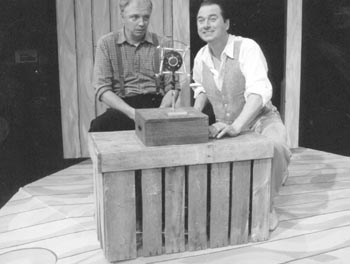![[Metroactive Stage]](/stage/gifs/stage468.gif)
[ Stage Index | North Bay | Metroactive Central | Archives ]
 Photograph by Jim Eckhart On Air: Tom Ammon (left) as David and Nicolae Muntean as Leon weave tall tales. Holy Foley 'The Voice of the Prairie' elicits the sounds and furies of 1920s America By Michael J. Vaughn CITY LIGHTS' PRODUCTION of The Voice of the Prairie begins when one of its cast members kicks the bucket. Fortunately, it's just Wayne Stribling, the sound-effects guy (known in radio-drama parlance as a Foley artist), and the bucket is just one of his instruments. John Olive's play follows Leon Schwab (Nicolae Muntean), a slick New York radio man who's wandering 1923 America with an interesting scam. He moves into a new town, sends out improv broadcasts to get the yokels to buy radios, then splits town, leaving them, essentially, with nothing to listen to. He's just a step in front of the FCC, whose new broadcast-license regulations have turned him into a pirate operation. Somewhere in Nebraska, Schwab recruits a local storyteller, David Quinn (Tom Ammon), and is just as shocked as anyone when Quinn's stories about his vagabond teenhood with a girl named Blind Frankie become the hottest thing since Huck Finn. As any Prairie Home Companion fan knows, watching a Foley artist can be fascinating fun. Stribling creates a rustling fire with a handful of cellophane, uses coconut shells to produce hoofbeats, produces a telephone ring with a ... well, with a telephone. But director Amy Himes' addition of this element adds to the playwright's already-substantial list of tricks. Olive uses walk-across interludes to preview lines from the forthcoming scene; throws in dark, voice-only scenes to convey Frankie's blindness; and jumps his narrative back and forth between 1895 and 1923 (the former played behind a "memory screen"). It all gets a bit too theatrical, especially for a story about the special brand of magic produced by one man sitting behind a microphone. Much of this is due to Ammon, who invests Quinn with a folksy, eminently likable style, without sacrificing his haunted quirkiness. ("Telling that story," he says, "made me feel like I stole something and got away with it.") The acted-out versions of Quinn's stories are enjoyable as well, thanks to Jacqueline Hillsman's unbridled enthusiasm as Frankie, and Joe Barra's squirrelly energy as young Davey. Muntean is not yet comfortable in Schwab's New York skin (or accent), but he does add an amusing element of anything-but-quiet desperation ("I have a little trouble sleeping," he complains. "I haven't slept since I was 21"). Victor Brandalise is even less subtle as Reverend James, employing biblical epithets ("The devil lives in the past!"), asthma attacks and an Arkansas accent as broad as a sow's behind to persuade his sweetheart, the grown-up blind Frances (Carol Enos), to ignore the tales of her childhood on the radio. You'll also enjoy Olive's mastery of the folky simile, phrases like "gutless as a hog on ice" or "I don't think all his dogs is barkin'." All in all, The Voice of the Prairie provides a nice escape to a time when we all made do with a lot less information.
The Voice of the Prairie plays Thursday-Saturday at 8pm and Sunday at 7pm through Oct. 20 at City Lights, 529 S. Second St., Santa Jose. Tickets are $15-$22. (408.295.4200) [ North Bay | Metroactive Central | Archives ]
|
From the September 27-October 3, 2001 issue of the Northern California Bohemian.
Copyright © Metro Publishing Inc. Maintained by Boulevards New Media.